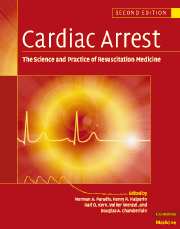Book contents
- Frontmatter
- Contents
- List of contributors
- Foreword
- Preface
- Part I Introduction
- Part II Basic science
- Part III The pathophysiology of global ischemia and reperfusion
- 12 The etiology of sudden death
- 13 Global brain ischemia and reperfusion
- 14 Reperfusion injury in cardiac arrest and cardiopulmonary resuscitation
- 15 Visceral organ ischemia and reperfusion in cardiac arrest
- 16 Mechanisms of forward flow during external chest compression
- 17 Hemodynamics of cardiac arrest
- 18 Coronary perfusion pressure during cardiopulmonary resuscitation
- 19 Methods to improve cerebral blood flow and neurological outcome after cardiac arrest
- 20 Pharmacology of cardiac arrest and reperfusion
- 21 Analysis and predictive value of the ventricular fibrillation waveform
- 22 Etiology, electrophysiology, and myocardial mechanics of pulseless electrical activity
- Part IV Therapy of sudden death
- Part V Postresuscitation disease and its care
- Part VI Special resuscitation circumstances
- Part VII Special issues in resuscitation
- Index
14 - Reperfusion injury in cardiac arrest and cardiopulmonary resuscitation
from Part III - The pathophysiology of global ischemia and reperfusion
Published online by Cambridge University Press: 06 January 2010
- Frontmatter
- Contents
- List of contributors
- Foreword
- Preface
- Part I Introduction
- Part II Basic science
- Part III The pathophysiology of global ischemia and reperfusion
- 12 The etiology of sudden death
- 13 Global brain ischemia and reperfusion
- 14 Reperfusion injury in cardiac arrest and cardiopulmonary resuscitation
- 15 Visceral organ ischemia and reperfusion in cardiac arrest
- 16 Mechanisms of forward flow during external chest compression
- 17 Hemodynamics of cardiac arrest
- 18 Coronary perfusion pressure during cardiopulmonary resuscitation
- 19 Methods to improve cerebral blood flow and neurological outcome after cardiac arrest
- 20 Pharmacology of cardiac arrest and reperfusion
- 21 Analysis and predictive value of the ventricular fibrillation waveform
- 22 Etiology, electrophysiology, and myocardial mechanics of pulseless electrical activity
- Part IV Therapy of sudden death
- Part V Postresuscitation disease and its care
- Part VI Special resuscitation circumstances
- Part VII Special issues in resuscitation
- Index
Summary
Except for a single group of papers written in the mid-1980s and a more recent preliminary report, there are no studies and no literature on myocardial reperfusion injury in the setting of cardiac arrest and ardiopulmonary resuscitation (CPR). From this perspective, the following discussion may be, as Iago claims Cassio's soldiership to be in Shakespeare's Othello, “mere prattle without practice.” It is to be hoped, however, that this discussion will serve to identify cardiac arrest and CPR as a setting in which reperfusion injury may occur; that it will point out where reperfusion injury may be relevant mechanistically and therapeutically in this particular clinical circumstance; and, ultimately, that it will encourage basic and clinical research in an area that remains largely unexplored.
Reperfusion injury
The primary therapy for myocardial ischemia is reestablishment of normal blood flow. Yet despite the proven benefit of reperfusion in ischemic syndromes such as acute myocardial infarction, evidence shows that some of this benefit may be lessened by injury caused by reperfusion itself.
The term reperfusion injury includes a number of potentially deleterious effects of reperfusion after a period of ischemia, including myocardial stunning, reperfusion arrhythmia, and reperfusion-related myonecrosis. Depending on the particular setting in which ischemia and reperfusion occur, these several types of reperfusion injury may be present alone or in combination.
Clinical settings in which reperfusion injury is thought to be important include postcardiopulmonary bypass, heart transplantation, and acute myocardial infarction treated with either thrombolytic therapy or immediate angioplasty.
- Type
- Chapter
- Information
- Cardiac ArrestThe Science and Practice of Resuscitation Medicine, pp. 282 - 297Publisher: Cambridge University PressPrint publication year: 2007



